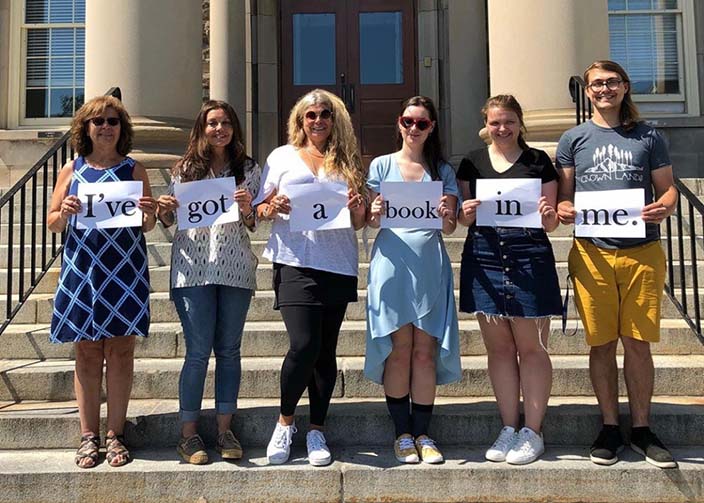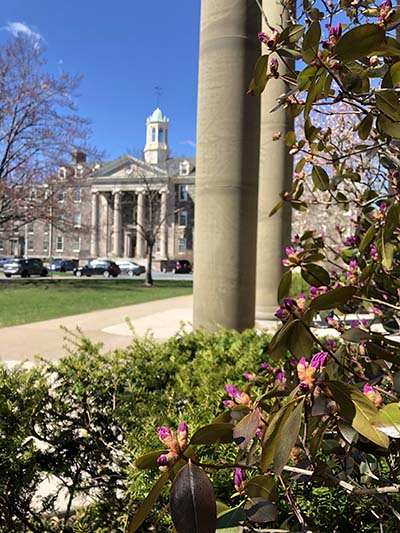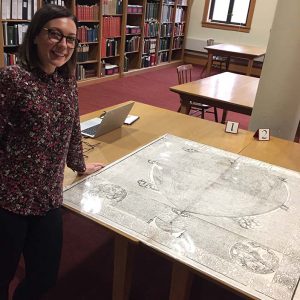 For the past eight Fridays, I have been sending you a letter. This will be the last of these weekly letters. From here, I will be writing less regularly as we all shift from our response to the first wave of this pandemic to living with COVID-19 under the reopening plans that are being developed or implemented in all provinces.
For the past eight Fridays, I have been sending you a letter. This will be the last of these weekly letters. From here, I will be writing less regularly as we all shift from our response to the first wave of this pandemic to living with COVID-19 under the reopening plans that are being developed or implemented in all provinces.
At King’s, we are making the same shift. The year past is past. We are now all preoccupied with the immediate and longer-term future. Our faculty and academic program directors are hard at work on how we will deliver our courses and programs in the coming year. We are developing a campus reopening plan for implementation when that becomes possible. We are developing a budget for a year in which we expect the College’s financial stability, recently joyously restored, to be the first of a number of years in which it will once again be severely tested.
So, it seems like the right time to shift from weekly updates to updates that are provided when events and developments warrant them. And besides, it is the Friday of the May long-weekend. I am sure we can all appreciate a bit of a break! But be assured we will continue to keep you updated regularly. In between my more infrequent updates, we will be keeping you informed through our normal channels of communication, including emails, the monthly Alumni Newsletter and our many posts on Twitter, Instagram, LinkedIn and Facebook.
In the coming days, we will be communicating to our students, in coordination with Dalhousie, on how our courses and programs will be offered in the coming year. But as you know from my previous updates, it will either be with exclusively or nearly exclusively online teaching and learning, or a mix of online and in-person methods. The governing concern is the safety, health and wellbeing of everyone – students, faculty, staff and all those who may be affected by what we do here at King’s. I am very aware of how anxious our students and our prospective students, and their parents, are to learn what our approach will be, especially as other universities make their announcements. I am hopeful we can definitively announce the approach King’s will follow in the very near future.
Meanwhile, we are already committed to conducting the annual summer residency for our MFA in Creative Non-Fiction, which happens in June, online. When I asked Executive Director Kim Pittaway what would make it work, she gave an answer that parallels the confidence FYP has in the power of small group tutorials to making learning in community into an online reality:
The heart of the residency has always been our small-group workshops. Those will continue to happen live … so that students are able to take part in the back and forth of peer feedback and discussion, in conversation with their mentors. We’ll be doing live readings, with evenings set aside for student readings, our Writer in Residence Jess McDiarmid, and alumni readings by graduates of the program who have recently released books. Most will feature readings and Q&A sessions. We’ve also added in “coffee break” virtual rooms, hosted by graduates of the program, where small groups of students can mix and chat informally.
It is always the human element, and not the technological component, that elevates teaching and learning to the King’s standard.

The MFA, by the way, is our latest success in our long history of innovation in designing unique academic programs. I have always thought it beautifully surfaces the love for the finely written word, and the belief in its power to change the world, that unites all our academic endeavours at King’s. I often think it does not get enough attention among our many shiny jewels, including from me. Its students are, like all King’s students, the most extraordinary people who happen to write the most extraordinary books that would not be written but for the MFA. Earlier this week the program celebrated its shortlisted nominees for the Penguin Random House Canada MFA Prize for best non-fiction book proposal.
 This week we shared with our graduating students our plans for celebrating them virtually, while we wait for the full Encaenia I have promised them when we are again able to gather together in Convocation. The details are a surprise, but I can say our graduands have been invited to submit a photo or video that highlights a memory or experience from their time at King’s. I look forward to sharing the surprise on May 29, which would have been Encaenia Day. It will be bittersweet.
This week we shared with our graduating students our plans for celebrating them virtually, while we wait for the full Encaenia I have promised them when we are again able to gather together in Convocation. The details are a surprise, but I can say our graduands have been invited to submit a photo or video that highlights a memory or experience from their time at King’s. I look forward to sharing the surprise on May 29, which would have been Encaenia Day. It will be bittersweet.
For generations, Encaenia Day has been associated with the glorious magnolias that bloom on either side of the front doors of Alex Hall. In honour of that fond memory of many, and to share this year’s magnolias with those who cannot be in Quad, I have been posting daily pictures of their blossoming beauty on twitter and instragram, in what I have dubbed “my @ukings magnolia watch.” You can follow their progress @billlaheykings on Twitter.

Dr. Justina Spencer
And before I close, I also share news about the arrival at King’s of Dr. Justina Spencer, the newest member of the Early Modern Studies Program, who will also teach in FYP. Dr. Spencer is an art historian who will ensure that our approach to the humanities continues to include art and art history, building on the wonderful legacy of Dr. Jannette Vusich. I am particularly excited by her enthusiasm for experiential learning, including our very popular art history course in Florence and hands-on curatorial work in our library. It is a pleasure to welcome her to our community.
I want to thank you for reading these letters and for the many generous responses I have received to them – this has fortified me. I also want to again thank everyone, now more than 70 of you, who have responded to my appeal for contributions to our Student Emergency Response Fund. I also want to particularly acknowledge Bernard Hibbitts, Don Harrison, Benedict O’Halloran and Dan O’Halloran, and Fred and Elizabeth Fountain for the major gifts they all have made to this Fund. The full list of our community contributors can be found here. Because of your generosity, students of tremendous promise will be able to start or continue their studies at King’s in the year to come.
Over the past two months, I have felt the power of the whole King’s community pulling together for four great causes: our students, each other, our College and our community. It is invigorating and inspiring to be part of such solidarity in the face of vast uncertainty and perilous threats. We will need it in the days ahead. But I know we will have it.
As always, I leave you with a recording from the collection of Halifax Humanities, this time another lecture by Dr. Angus Johnston, Pico of Mirandola: The Dignity of Man and Renaissance Neoplatonism.
Enjoy the weekend and the beginning of summer. Let us be well and good to yourselves and each other.
Bill

